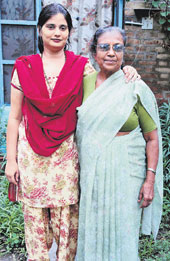 |
| Hitting back: Dimple Menezes with her foster mother Sulochana Karanjia |
Time, they say, is the greatest healer. But 28 long years don’t seem to have made Dimple Menezes forget her hurt. Which is why she is now dragging her biological parents to court.
Abandoned at birth by her parents, Harbans Kaur and Sukhdev Singh, Dimple was given a fresh lease of life by gynaecologist Sulochana Christabel Karanjia, who found the 12-day-old infant in a garbage bin in the St Mary’s Hospital compound in Tarn Taran in Punjab on May 19, 1977.
Dimple was formally adopted by Karanjia, grew up to earn a degree in computer studies and was married to Jude Eric Menezes on May 9, 2003.
Her biological parents tried to reclaim their child when she was 12. Although she refused to go with them, “they did keep in touch with me,” says Dimple.
Problems, however, cropped up when Dimple, prior to her marriage , requested her parents to acknowledge her as their daughter, purely for social acceptance. “Since they had recognised me as their child earlier, I saw no reason why they wouldn’t stand by me at the time of my wedding,” Dimple reasons.
The couple, she says, agreed to grace the wedding, but on condition that the ceremony be held in accordance with Sikh customs. “But my foster mother is Christian, and so are my in-laws,” says Dimple. “And I too have been brought up as a Christian. How could I hurt my foster mother’s sentiments by marrying according to my parents’ wishes?”
Sticking to her guns, Dimple had a Christian wedding. This led her biological parents to sever all ties ? or the little that there was of them ?with her. “They went on record saying that they had no filial relation with me,” says Dimple. Deeply hurt and humiliated, she filed a civil case under the Hindu Adoption and Maintenance Act at the Punjab and Haryana High Court in Chandigarh in October 2003.
“We have sued Dimple’s parents for compensation worth Rs 10 lakh towards the maintenance, education and marriage expenses of an abandoned child,” says S.P. Chopra, Dimple’s lawyer. The case came up for hearing on July 20, but has been stayed until August 24.
Dimple’s tale of an infant being left at the mercy of pariah dogs in a trash bin may not be wholly new in India. But senior lawyers say the act of children dragging their parents to court is still a nascent concept in the country. Filmstar Amisha Patel may have done it a while ago, but how many people in India would have the courage to go to such lengths even today?
“In fact, the case is of a very different nature altogether,” says Supreme Court lawyer Vrinda Grover. The law, she says, makes provisions for abandoned minors to demand compensation for their maintenance till they either reach adulthood or become financially stable. “But here we have an adult, now married to another person who can support her financially, demanding compensation for the years gone by. Since this is unprecedented, one can’t really say how her claim would be dealt with by the law,” says Grover.
Supreme Court lawyer Lalit Bhasin, however, thinks Dimple would indeed be entitled to compensation, since she has every right to seek redressal for the social humiliation she may have faced in the past, owing to her parents’ actions. “I was often taunted in school because I didn’t know who my father was,' confirms Dimple.
The case is further complicated by the volte-face done by Dimple’s biological parents following her wedding. “Since I filed the case, they have not responded to any of the court summons sent to them,” says Dimple. “In fact, they have even threatened to file a case to sue me for making false claims,” she adds.
Chopra, on a more assertive note, says they would urge the court to take extreme measures to prove that Dimple is indeed the biological child of her parents. “We would demand a DNA test, if necessary,” says the lawyer.
Though the case is largely civil in nature, the fact that Dimple may have been wilfully abandoned by her parents could also impart a criminal tinge to it. “Abandonment of a minor could be seen as cruelty,” says Supreme Court lawyer Indira Jaising. “And if it is proved in court that they had discarded the child solely for the purpose of abandoning her, they could be charged under Section 317 of the Indian Penal Code, which deals with such actions.”
If proven guilty, Dimple’s parents could be jailed for as long as seven years, apart from being slapped a monetary fine.
As the case goes under the gavel, Dimple would be hoping to find some solace for all the mental trauma she has been subject to in the past.
And at the end of the day, she will have set a precedent for the thousands of other children who are handed out a similar fate by their parents. It’s a pity that not all of them are as lucky as Dimple when it comes to living to tell the tale.











